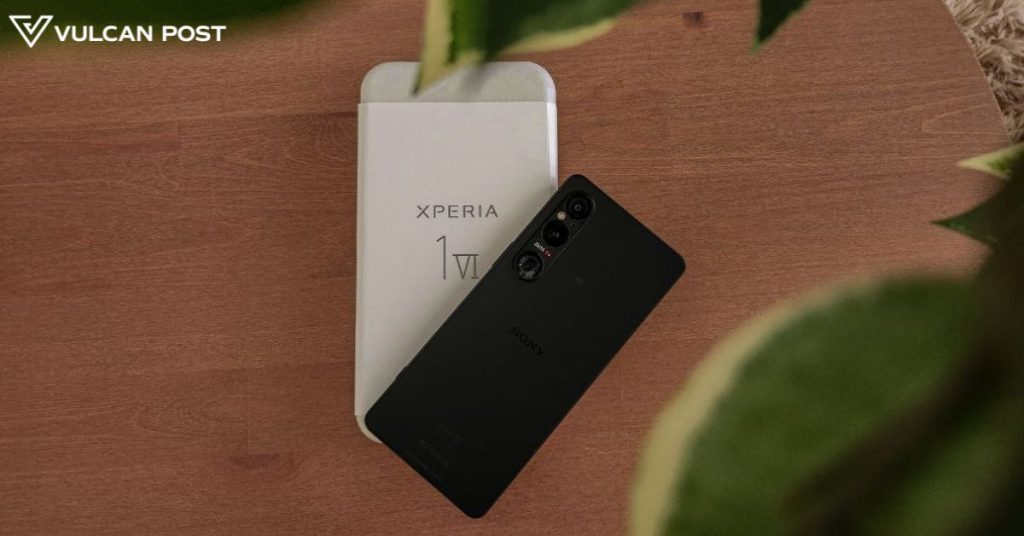Let’s face it, in the world of smartphones, cameras are everything. At least, that’s what my inner shutterbug tells me.
So, when the Sony Xperia 1 VI landed in my hands, I was eager to see if it could live up to the hype and satisfy my photography cravings. Especially knowing that the latest model is known for its camera features.
But first, let’s take a look at the overall features and performance of the phone.
First impressions
Unboxing the Xperia 1 VI was a bit of a surprise. The handset comes in a plain box made of recycled paper without anything else inside. There’s not even a cable for charging or data transfer.
So if you want a compatible charger, you’d need to buy one of Sony’s 30W PD-enabled chargers (or a third-party one with the same specifications).
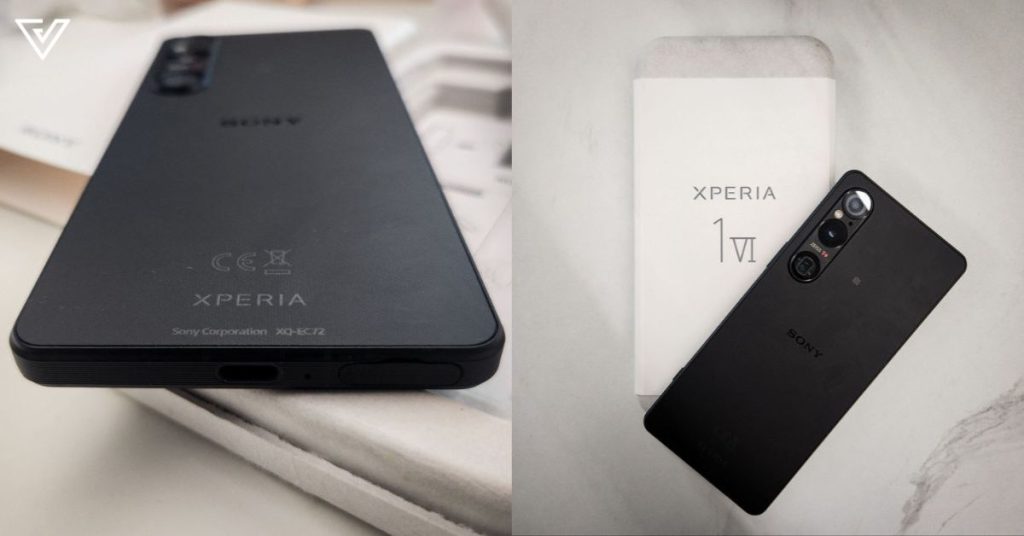
Design-wise, the Xperia 1 VI is definitely a looker. It feels premium with its glass front and back and that aluminium side frame.
The back of the phone has a matte finish with a special texture. It’s nice to hold and doesn’t show fingerprints or smudges.
Plus, the sides have small textured strips for a good grip. Since this new Xperia model is wider than the last one, the grippy texture is really useful even if it feels more like plastic than glass. Still, I appreciate Sony prioritising function over form.
All the buttons are on the right side of the frame. The volume button is right above the power button, and they’re both easy to reach.
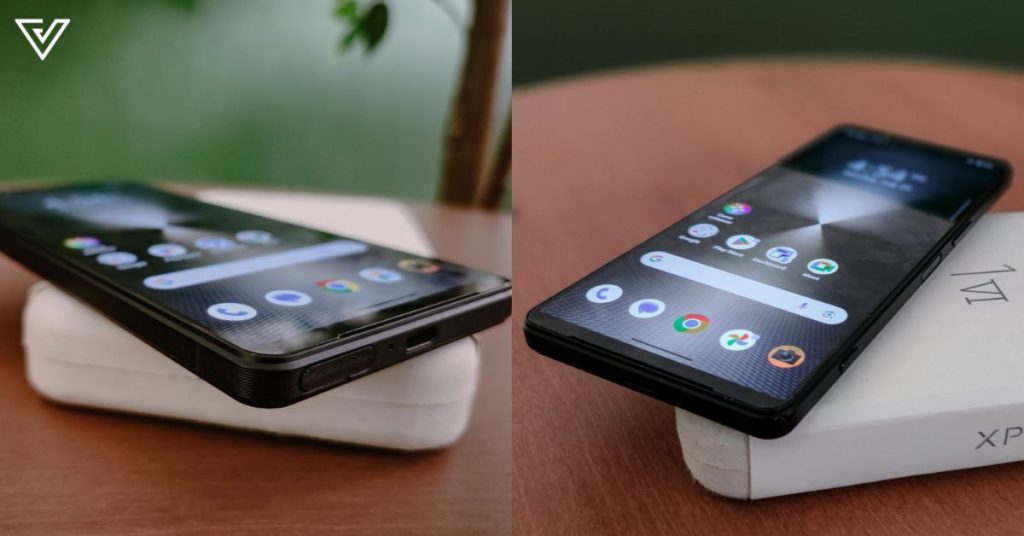
However, the power button, which also works as a fingerprint scanner is a bit of a fumble. It’s fast when you hit it right, but it’s a tiny target. I feel that an under-display fingerprint scanner would be more convenient.
It is available in Black, Platinum silver, Khaki green, and Scar red colours.
| Specifications | |
| Dimension | 162 x 74 x 8.2mm |
| Weight | 192 g |
| Body type | Glass front (Gorilla Glass Victus 2), glass back (Gorilla Glass Victus), aluminium frame IP65/IP68 dust/water resistant (up to 1.5m for 30 min) |
| Display size | 6.5 inches, 1080 x 2340 pixels, 19.5:9 ratio |
| Display type | LTPO OLED, 1B colours, 120Hz, HDR BT.2020 |
| Sim | Nano-SIM and eSIM or Dual SIM |
| Data speed | HSPA, LTE, 5G |
| Wifi | Wi-Fi 802.11 a/b/g/n/ac/6e/7, tri-band, Wi-Fi Direct, DLNA (WI-FI 7 will be enabled with a software update) |
| Bluetooth | 5.4, A2DP, LE Audio, aptX HD, aptX Adaptive, aptX Lossless |
| NFC | Yes |
| USB | USB Type-C 3.2, OTG, video output |
Performance
Equipped with the latest Snapdragon processor, the Xperia 1 VI delivers smooth performance. While it might not be the fastest smartphone on the market, it handles demanding tasks effortlessly.
Sony went from a 4K display to a Full HD+ one on this model. Honestly, I was worried about the downgrade, but the screen is still really good. It’s bright, colours pop, and it’s easy on the eyes.
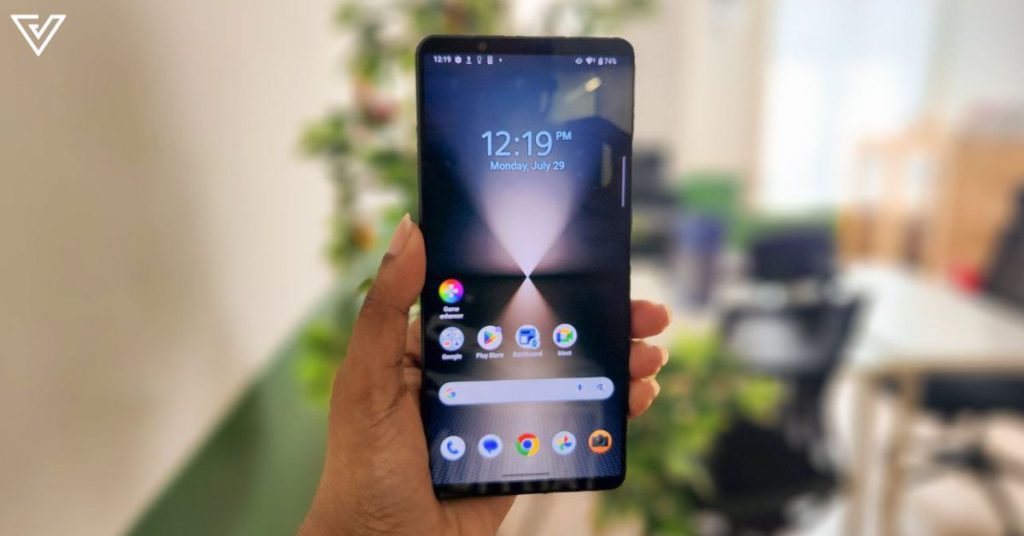
I would say that probably helps with the battery life too, which is always a win. The battery life is a significant improvement over previous models. The combination of a power-efficient display and well-optimized software contributes to longer usage between charges.
| Performance specifications | |
| Processor | Octa-core (1×3.3 GHz Cortex-X4 & 3×3.2 GHz Cortex-A720 & 2×3.0 GHz Cortex-A720 & 2×2.3 GHz Cortex-A520) |
| Chipset | Qualcomm SM8650-AB Snapdragon 8 Gen 3 (4 nm) |
| GPU | Adreno 750 |
| RAM & storage | 256GB 12GB RAM, UFS |
| External storage | microSDXC (uses shared SIM slot) |
| OS | Android 14 |
| Battery | 5000 mAh, non-removable battery 30W wired, PD3.0, PPS, 50% in 30 min Wireless Reverse wireless |
Apart from that, the front camera is outside the display, so when you’re looking at photos or videos, nothing gets cut off. Sony goes for a sleek look with their rear camera, avoiding the bulky designs you see on other phones. The three lenses stick out a bit, but they’re slimmer compared to many other phones.
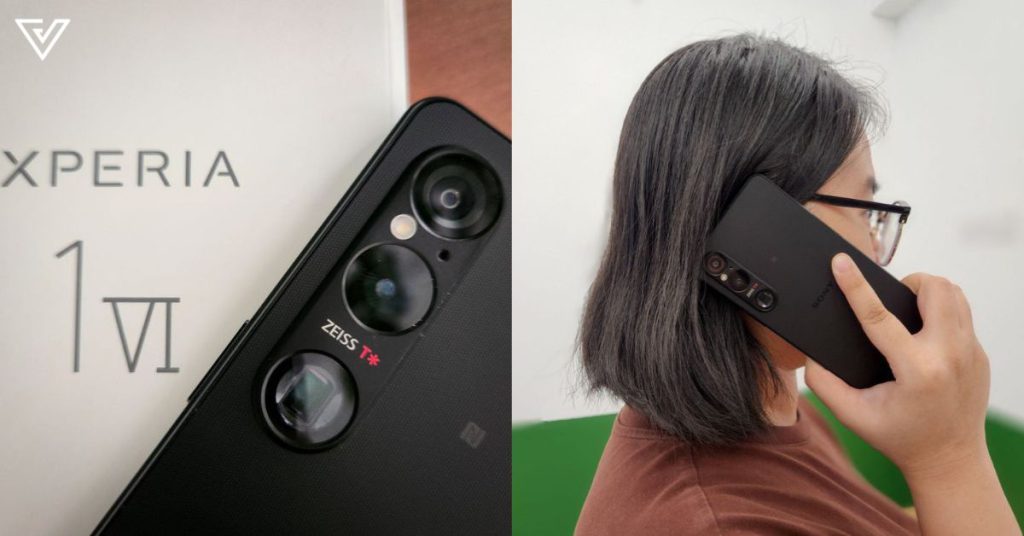
The speakers are another highlight. They’re loud, clear, and perfect for binge-watching shows or listening to your favourite tunes.
The music sounds super clear, even when you crank it up. You can really hear all the details in the songs. And the bass is just right—it adds some punch without overpowering everything else.
| Audio | |
| Loudspeaker | With stereo speakers, -24.3 LUFS |
| Sound jack | 24-bit/192kHz Hi-Res & Hi-Res wireless audio Dynamic vibration system Snapdragon Sound |
| Radio | Loudspeaker |
Camera
Now, let’s get into the part I was most excited about, the camera feature.
The Sony Xperia 1 VI’s camera system is a strong point, especially for those who enjoy manual controls and photography experimentation.
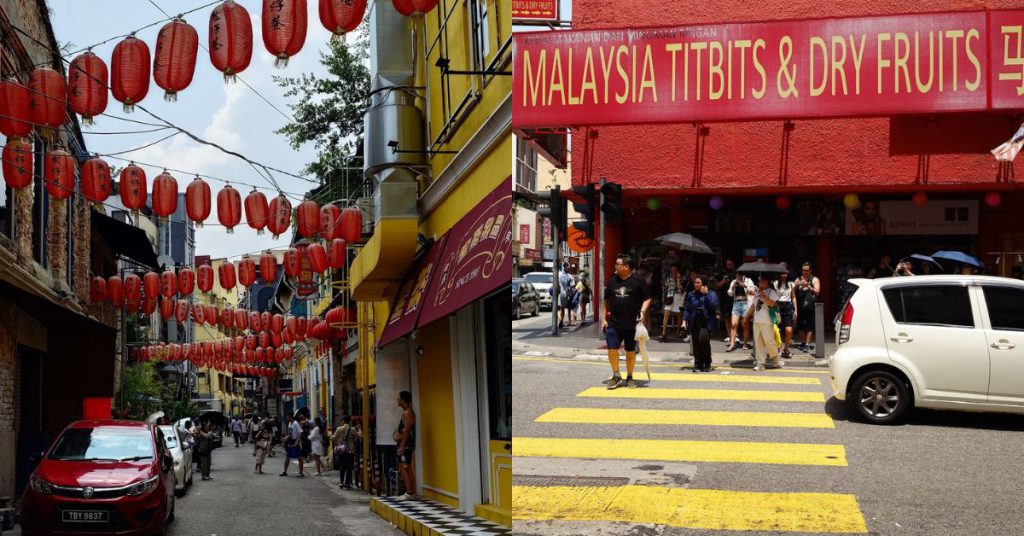
It has a similar triple camera setup to the Xperia 1 V, featuring a wide-angle main camera, an ultrawide camera, and an advanced telephoto camera with continuous optical zoom. The selfie camera is also the same as last year’s model.

However, there are some notable improvements from what I’ve gathered online.
This year’s big upgrade is the longer zoom range on the telephoto camera, which now offers optical zoom from 3.5x (85mm) to 7.1x (170mm), compared to last year’s 3.5x-5.2x (110mm). The telephoto camera also has a new macro mode, providing 2x magnification at 120mm and focusing as close as 4cm with manual focus and focus peaking aid.
The ultrawide camera still has autofocus but now supports an auto macro mode. When you get super close to a subject (up to 20cm), it switches to crop the centre of the image for a closer view without distortion.
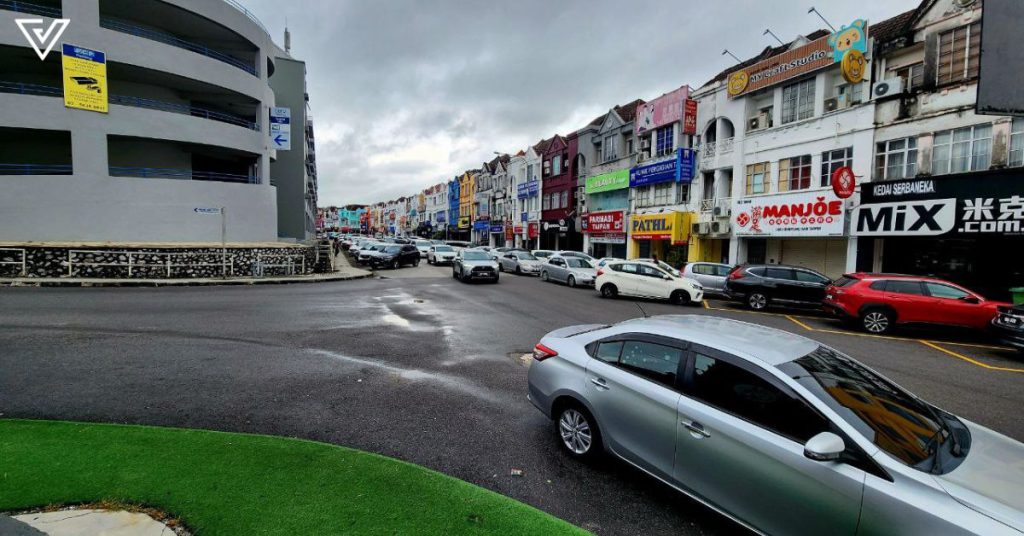
For those with a creative eye, the telephoto macro hardware can deliver amazing results, including shooting 4K video at 120 frames per second in macro mode, which is pretty cool.
The software has been significantly improved, combining the multiple Pro photography and video apps into one user-friendly app with plenty of advanced options for those who want them.
While it may not be the ultimate point-and-shoot camera phone, it’s more user-friendly than ever, and using the advanced features can yield great results. Not only that, Sony includes a dedicated camera shutter button on the side for easier and more ergonomic shooting.

| Camera & video | |
| Rear camera | Triple: 48 MP, f/1.9, 24mm (wide), 1/1.35″, dual pixel PDAF, OIS + 12 MP, f/2.3, 85mm (telephoto), f/3.5, 170mm (telephoto), 1/3.5″, dual pixel PDAF, 3.5x-7.1x continuous optical zoom, OIS, 4cm macro @ 120mm, no AF + 12 MP, f/2.2, 16mm, 123˚ (ultrawide), 1/2.5″, dual pixel PDAF |
| Front camera | 12 MP, f/2.0, 24mm (wide), 1/2.9″ |
| Video | 4K@24/25/30/60/120fps HDR, 1080p@30/60/120fps; 5-axis gyro-EIS, OIS Selfie: 4K@30/60fps, 1080p@30/60fps, 5-axis gyro-EIS |
| Features | Zeiss optics, Zeiss T* lens coating, LED flash, panorama, HDR, eye tracking Selfie: HDR |
Verdict
This is not a cheap phone. Priced at RM6,499, it’s definitely higher than the Galaxy S24 Ultra and iPhone 15 Pro Max.
However, it’s chic, slim and lightweight. The screen is great, even though it’s not the highest quality. Plus, the battery lasts longer too.
Sony makes a lot of the camera parts for other phones, but this one feels like their best camera phone yet. If you are a photography nerd, you will definitely appreciate the solid hardware coupled with the various Pro-oriented modes and settings for photos.
| Pros | Cons |
|---|---|
| Slim and lightweight | Expensive |
| Headphone jack and microSD support | Limited software updates |
| Good camera quality with adjustable zoom lens | |
| Good battery life |
VP Verdict is a series where we personally try and test out products, services, fads, and apps. Want to suggest something else for us to try? Leave a comment here or send the suggestion to our Facebook page.



